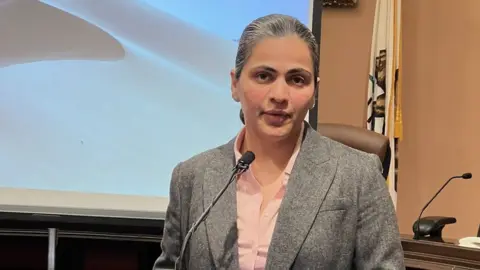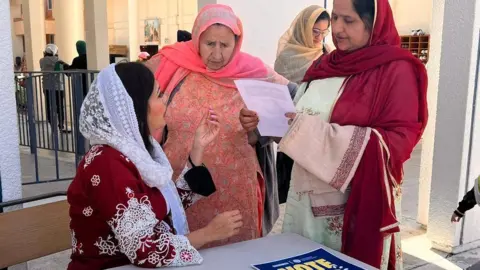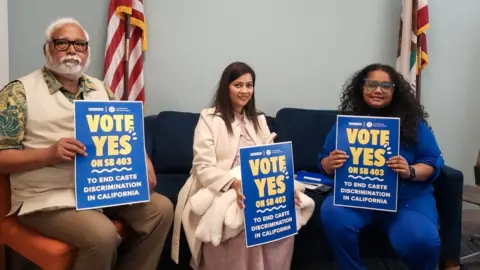The divisive debate over California's anti-caste bill
 Prem Pariyar
Prem PariyarA bill introduced to make caste discrimination illegal in California is set to come up for discussion in the state assembly this week. Savita Patel, a California-based independent journalist, speaks to those supporting and opposing the bill becoming a law.
Sukhjinder Kaur*, a nurse at a hospital in California, works long and tiring hours serving patients. But whenever it's break time, things become oppressive.
She is a Dalit (a community that is placed at the bottom of India's deeply discriminatory caste hierarchy) and says she often faces casteist insults from her South Asian colleagues.
Dalit rights activists say scores of caste-oppressed Californians face housing, educational, professional, and social discrimination.
In March, Senator Aisha Wahab, a lawmaker from the Democratic Party, authored and introduced the SB-403 bill - legislation that seeks to add caste as a protected category in the state's anti-discrimination laws alongside gender, race, religion and disability.
The bill was passed by the state's senate in May with a 34-1 vote. If it goes through in the state assembly, California will become the first US state to ban caste discrimination.
"Nurses from upper castes pass slurs about chamars [a pejorative term for Dalits] being dirty and polluting," says Ms Kaur, who is among those who are in favour of the law.
In February, Seattle became the first city in the US - and outside South Asia - to outlaw caste discrimination, generating momentum for the legislation in California. It is being propelled by the same broad multi-faith, inter-caste, multi-racial coalition of over 40 American and international Dalit and human rights activists and organisations, led by California-based Equality Labs.
California has a large South Asian diaspora and is home to some of the world's biggest tech companies.
 Renu Singh
Renu SinghThe state is home to more than half of the 500,000-plus Sikh population in the US and gurudwaras (Sikh temples) in California have been mobilising momentum to outlaw caste discrimination.
Two of the community's largest advocacy groups - The Sikh Coalition and Sikh American Legal Defense and Education Fund - support the bill. Among Sikhs, it is the Ravidasia community - the largest Dalit community in the state with approximately 15,000-20,000 members - which is advocating for the bill at grassroots level.
Renu Singh, who follows the Ravidasia tradition and is also a women's rights activist, has been urging women to speak about their own experiences of caste discrimination and those they see around them so that lawmakers understand the gravity of the issue.
Data from an Equality Lab study shows that one in four caste-oppressed people from the South Asian American diaspora have faced physical and verbal violence; one in three has faced discrimination in education, and two out of three have experienced workplace discrimination.
It was the first extensive study of caste distribution and its effects in the US and had over 1,500 respondents. The findings, published in 2018, say that those from "lower castes" fear retaliation and worry about being "outed" and hence "hide their caste".
However, a significant section of the Indian diaspora rejects caste discrimination claims.
Deepak Aldrin, a San Francisco-based Dalit activist is not in favour of the bill. "I've lived here for 35 years. No Hindu has ever asked me what caste I belong to," he says.
The bill is meeting strong opposition from many Indian-American individuals, religious and professional groups, who argue that even though it does not specifically name their religion, it will "discriminate against Hindus, their places of worship and even make them less hiring worthy".
They say the existing laws in California are sufficient to address any discrimination and are mobilising the community to urge their lawmakers to disallow the legislation to proceed.
 Renu Singh
Renu SinghMany businesses and Hindu temples under HinduPACT - an American Hindu grassroots advocacy initiative - have appealed to California lawmakers to reject the bill. Its convenor Ajay Shah says that the legislation is "deeply flawed, ill-intentioned and targets children and youth from the Indian subcontinent and those who follow the Hindu dharma [Hinduism]."
Suhag Shukla, co-founder and executive director of the Hindu American Foundation, says this bill is already creating an "undesirable" awareness about caste. She says she has been "hearing inappropriate queries from workers, especially in tech, who are being asked about their caste by non-South Asians". She says if this becomes a pattern, it can be grounds for ethnicity-based harassment.
The foundation has sued the state in a federal court for an "unconstitutional definition of caste" and has also challenged the addition of caste to its non-discrimination policy, saying that it "singles out one community for ethnic profiling and additional policing".
Those opposing the bill say they are also perplexed as to how the state plans to identify an individual's caste since it's a very complex issue, .
The bill, Ms Wahab explains, does not include details for identifying caste, similar to other protected categories.
"There is no language on how caste will be determined. This is simply an anti-discrimination bill. When somebody takes a matter up to the courts, that is usually when subject matter experts are engaged, the type of discrimination potentially that has taken place [is investigated]."
Ms Wahab says she has received "death threats" after proposing the bill. She now faces a recall campaign and a possible re-election. She adds that the "visceral reaction" to the bill is "disheartening" and has urged Californians to read the bill.
"Whether you're upper caste or lower caste, it does not matter, it will protect you as well," she says.
*Some names have been changed to protect identity.
BBC News India is now on YouTube. Click here to subscribe and watch our documentaries, explainers and features.

Read more India stories from the BBC:

